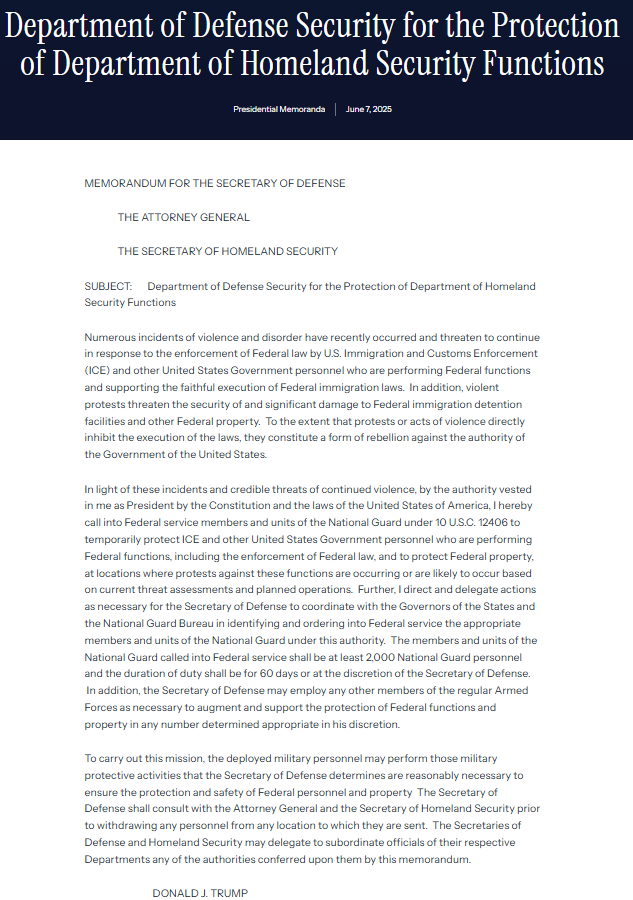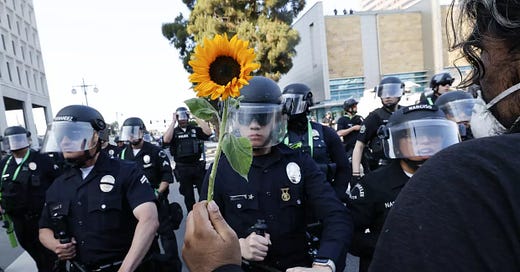The Memo Is the Marching Order
Trump’s June 11 memo isn’t just about ICE. It’s about redefining protest as rebellion, and sending in the troops to prove it
It came in a memo.
Three clipped paragraphs. Quiet. Bureaucratic. Boring, even… only if you’re not paying attention.
But we have to.
Because beneath that dull exterior is something radical. Something dangerous. Something designed to escalate a movement into a crisis, and a president into a hammer.
Signed by Donald Trump, the memo directs the Secretary of Defense to federalize 2,000 National Guard troops and, if desired, deploy “any number” of active-duty military to protect ICE officers and federal property in cities where immigration enforcement is being protested. The justification?
“To the extent that protests or acts of violence directly inhibit the execution of the laws, they constitute a form of rebellion against the authority of the Government of the United States.”
Rebellion.
Not protest. Not dissent. Not disruption. Rebellion.
That word does a lot of work.

It’s not just rhetorical - it’s legal. It unlocks presidential powers that bypass governors, escalate military engagement, and sidestep political optics. It doesn’t declare martial law, but it walks right up to the line. And it sets a precedent that
dissent = REBELLION. protest = THREAT. criticism = CHAOS
We need to understand what’s happening right now. Not tomorrow. Not when it’s more obvious. Now.
This isn’t about some theoretical tipping point. We have tipped. We are living inside the moment that historians will one day name as the shift. And we don’t need to call it authoritarianism because that word is too soft now, too tired. What we are living under is hard rule. What we are witnessing is a government of enforcement, where the purpose of power is to maintain itself, and dissent is rebranded as threat.
Legally, the President has invoked 10 U.S.C. §12406 (a statute that allows federalization of the National Guard in the case of “rebellion” or when laws cannot be executed). But that statute has rarely been used on its own. The last time it happened? Nixon. 1970. To break a postal strike. And before that, 1965… Selma. When the Guard was federalized to protect civil rights marchers from racist state authorities. Now it’s being used to send troops against a state that doesn’t want them there. Not to enforce rights, but to suppress resistance.
They didn’t choose Texas, where the “border crisis” rages loudest. They didn’t choose Storm Lake, Iowa, where undocumented workers keep meatpacking plants afloat. They chose Los Angeles.
18.5 million people. Diverse. Loud. Defiant. With a progressive government that has resisted ICE and challenged federal overreach in court. That’s what they needed: a symbolic opponent. A stage.
Yes, protests erupted after aggressive ICE raids. Thousands are marching. But the unrest isn’t uniform, and not across the city. Not outside the bounds of local control. Even the mayor of L.A., Karen Bass, praised peaceful demonstrators. Some clashes, some vandalism, yes. But not rebellion. Not insurrection.


Still, the word made it into the memo. Deliberately.
This is not just law enforcement. It’s message control. It’s theater. And the memo is the script.
They are making an example. And the fact that the protests are happening in just a few corners of a massive city is part of the point. It doesn’t have to be widespread; it just has to be visible. It has to look like a threat. That way, when troops are sent in, it appears proportional. Justified. Expected.
This is how a regime stabilizes itself through performance.
First: find an act of resistance. Frame it as a crisis.
Then: escalate. Use federal muscle. Deploy. Dramatize.
Finally: normalize.
And this Saturday, they will put that normalization on parade.
Washington, D.C. - June 14th - Trump’s birthday and the 250th anniversary of the U.S. Army. A military parade. 6,600 troops. 150 vehicles. 50 helicopters. Tens of millions of dollars. A spectacle.
They’ll say it’s about history. But the timing is too perfect. The scale, too deliberate. It’s a show of force dressed as tradition. A warning broadcast live. A synchronized display of the memo’s subtext: dissent is rebellion. Rebellion deserves response.
We do not need to imagine a moment when the country “turns.” We are standing in it.
This is not the soft erosion of norms. This is the hardening of state muscle. Law spoken through deployment. Presence over persuasion.
And it is happening in full view, if we’re looking in the right direction.
The president has federalized 2,000 National Guard troops. He has authorized active-duty military to support domestic operations. He is doing so against the objection of California’s governor. Without invoking the Insurrection Act outright, he is laying its foundation. And he is doing so in a way that bypasses traditional legal thresholds… by leaning on a statute few have used, and fewer still understand.
This is what governance by enforcement looks like.
And the implications are massive: if this memo stands, if this interpretation holds, then the president can deploy troops to any city where protest “inhibits” a federal operation. Climate protest at a pipeline? Rebellion. Labor strike at a federal contractor? Rebellion. Student occupation of a building? Rebellion.
And if the troops arrive, they come under Title 10. Meaning they are federal troops. Meaning they are bound by Posse Comitatus. Meaning they should not engage in law enforcement. But when the lines are blurred, when ICE is present, when streets are tense, when images are managed; those distinctions disappear.
They are not hiding what they’re doing. And so we cannot hide from what it means.
This is not about one memo. This is about the ground shifting beneath our feet.
If you’ve been waiting for the moment to speak, to act, to resist - this is it.
They are watching how we respond. They are counting on fatigue. On silence. On disbelief.
But we have to stay awake.
We remember what struggle looks like. We remember that power will always rewrite the law to serve itself. And we know that if protest can be recast as rebellion, then rebellion can be recast as justification for force. And that means the next move is already written.
So hear this clearly:
You do not need to be calm. You do not need to be silent. You do not need to wait.
We do not ask for a seat. We take our stand.
Because this is not governance. This is suppression.
And it will not stop unless it is stopped.
This to warn you. The line’s already been crossed.
Because the machinery has already moved into place. Because the soldiers have already been sent. Because the definition of rebellion has already been rewritten in black-and-white.
Because the memo is out. And we know how these stories go.
Not all at once. Not with boots on your doorstep. But with a slow shifting of what power looks like. With new definitions. New justifications. New uniforms in familiar places.
So if it feels like something is tightening around the edges - no, you're not imagining it.
If it feels like the room is getting smaller… it is.
You don’t need a headline to tell you when a government starts turning inward.
You feel it in your gut.
You see it in the silences.
You hear it in the sound of protest being reclassified as threat.
That sound is getting louder. Because it’s here.



